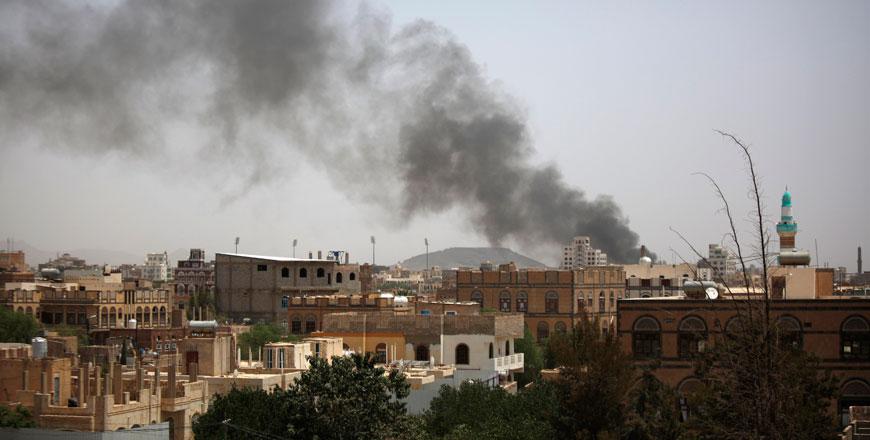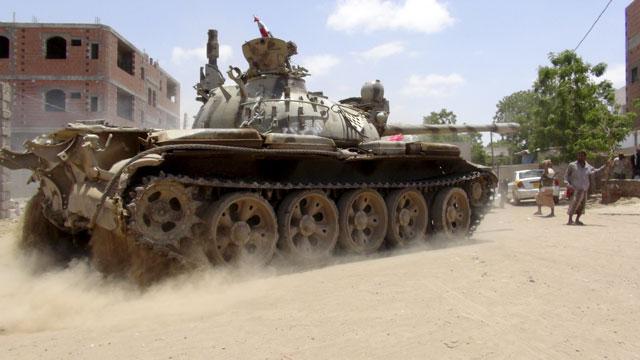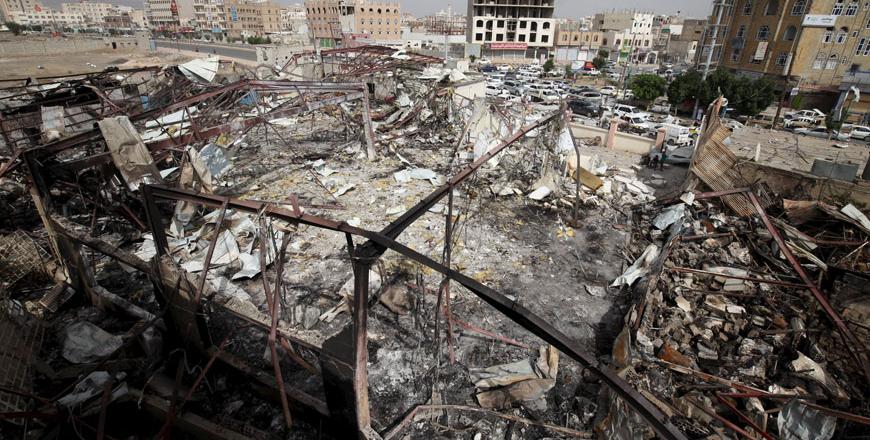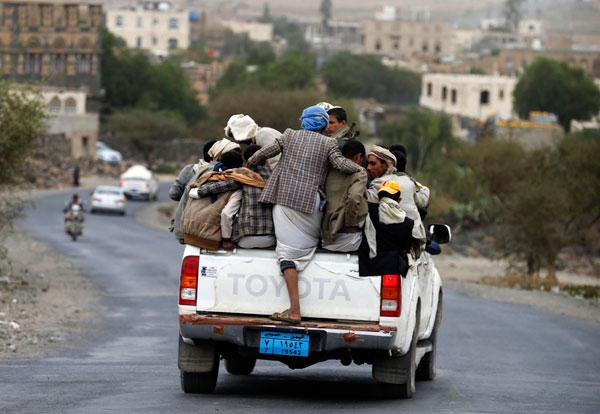You are here
Air strikes, clashes shake Yemen’s UN humanitarian truce
By AFP - Jul 12,2015 - Last updated at Jul 12,2015

Smoke rises after a Saudi-led air strike in Sanaa, Yemen, Friday (AP photo by Hani Mohammed)
SANAA — A UN-proposed Yemen humanitarian truce got off to a shaky start Saturday after Saudi-led coalition warplanes struck rebel positions and clashes persisted between insurgents and pro-government fighters.
The six-day ceasefire came into effect just before midnight Friday as aid agencies scrambled to rush desperately needed relief supplies to millions of people threatened by famine.
The leader of the Shiite Houthi rebels said he did not expect the truce to hold, while the Saudi-led coalition has not committed to the plan to cease hostilities.
One Saudi official described the measure as "useless", questioning whether the Iran-backed rebel fighters would stick to it.
Coalition warplanes raided Houthi positions in the central city of Taez, where clashes between the rebels and fighters loyal to exiled President Abed Rabbo Mansour Hadi continued after the truce.
Violence raged through the night in Taez, with witnesses saying the Houthis had also bombed several districts.
Yemen’s official news agency, which is run by the exiled government, accused the Houthis and allied troops loyal to former president Ali Abdullah Saleh of sending reinforcements to the city ahead of the cessation.
In the south, coalition warplanes also hit rebels in the port city of Aden and nearby Lahj province, witnesses said.
The raids came after the rebels bombed several neighbourhoods of Aden, according to Abdullah Al Dayani, a spokesman of the southern fighters allied with Hadi.
Warplanes also flew sorties over the capital Sanaa, but there were no attacks after midnight, witnesses said.
‘Not much hope’
The six-day pause to allow in desperately needed aid was declared after UN Secretary General Ban Ki-moon received assurances from Hadi and Houthi rebels that it would be respected.
“We do not have much hope for the truce to succeed,” said the rebels’ chief Abdulmalik Al Houthi in a televised statement aired ahead of the truce deadline.
“The success of the truce depends on the commitment of the Saudi regime and is conditioned to a complete end to the aggression.”
World Food Programme spokeswoman Abeer Etefa said the truce was “our final hope” to reach areas needing aid.
She added two ships carrying food and fuel were waiting off the southern port of Aden to dock.
The truce comes more than a week after the UN declared Yemen a level-3 humanitarian emergency, the highest on its scale, with nearly half the country facing a food crisis.
“It is imperative and urgent that humanitarian aid can reach all vulnerable people of Yemen unimpeded and through an unconditional humanitarian pause,” said UN spokesman Stephane Dujarric.
UN aid agencies are ready to scale up operations during the pause, although the response to an appeal for $1.6 billion has been meagre, with just 13 per cent of that amount received so far.
More than 21.1 million people — over 80 percent of Yemen’s population — need aid, with 13 million facing food shortages.
The UN says the conflict has killed more than 3,200 people, about half of them civilians, since late March.
Etefa said the WFP delivered 9,000 tonnes of food to its warehouses in Yemen during the past week, adding the truce was needed to secure its mission.
Nearly 40 trucks in two convoys to Aden and Saada had yet to reach their destinations because of damaged roads and security problems.
“We hope to see an effective respect for the ceasefire, and to allow us to reach all parts of Yemen regardless of who controls them,” she said.
UNICEF said it was stepping up nutrition screening, vaccinations and other life-saving interventions for millions of children, with teams having to “brave extremely hazardous conditions”.
“If they don’t do that more children are likely to die from malnutrition and preventable diseases,” said Julien Harneis, the Yemen representative for the UN children’s fund.
This is the second ceasefire since the coalition launched its March air campaign against the northern rebels and their allies, troops loyal to former president Saleh.
A five-day truce in May allowed aid to reach civilians, but UN efforts to prolong it failed.
Related Articles
Fierce clashes between rebels and pro-government forces killed dozens across south Yemen on Saturday, threatening to derail a humanitarian ceasefire drawn up to bring vital aid to the war-wracked country.
SANAA — Saudi-led coalition warplanes bombarded Yemeni rebels Sunday, witnesses said, in a new blow to a UN-proposed truce in the impoverish
ADEN — Warplanes from the Saudi-led coalition fighting Iran-backed rebels in Yemen hit positions of pro-government forces by mistake on Mond


















